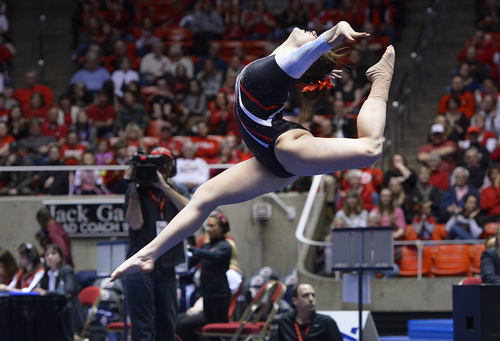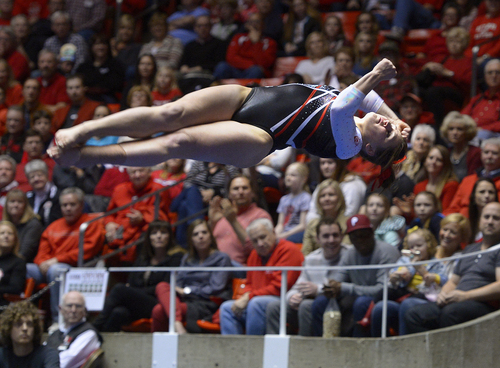This is an archived article that was published on sltrib.com in 2014, and information in the article may be outdated. It is provided only for personal research purposes and may not be reprinted.
Ask any athlete who participates in a team sport about the difference between success and failure, and team chemistry will ultimately enter the discussion.
It is the elusive, hard to grasp ingredient that can make or break a team.
But how do teams get it and what helps it grow? The answer to that question is as intangible as the thought of team chemistry itself.
It's virtually impossible to measure the impact of a concept based on emotions, although some are trying. A sports analytical company called SyncStrength is experimenting with biofeedback markers to try to measure performance and behavior among teammates to develop patterns of successes and failures.
Such efforts are becoming more popular as the connection between physical ability and emotional ties among teammates is valued in a team's success. After all, what better place to gain an advantage over an opponent than in the mental arena?
"It is a huge element," said psychologist Nicole Detling, who works regularly with University of Utah athletes. "When you have everyone working hard toward one goal, it is going to make you that much stronger as a team because everyone is there to lift each other up."
In the case of the Utes, the gymnastics team made a much more conscious effort of building bonds with one another this season after last year's disappointing results.
Talent and consistency were certainly an issue, but chemistry, or a lack of it, was also blamed for Utah's struggles.
"College sports are interesting," senior Mary Beth Lofgren said. "You throw a bunch of people together from all different parts of the country, even the world, and you hope it works out. It can be tough to do. Luckily this team has great chemistry. We like being with one another."
That wasn't always the case in the past, despite some of the coaches' best efforts.
They've held team bonding events, social gatherings and made other attempts to build team chemistry in the past and it hasn't worked, coach Greg Marsden acknowledged.
"I've been there before and it has been pretty miserable," he said. "I've been where I've had to battle at times to get them off their cellphones at the table, and we've had to work hard at everything that normally keeps a team together and it just hasn't happened."
Marsden likened the situation to being in a marriage because "if you think you can change people, you are making a big mistake — you just have to accept them for who they are."
To that end, chemistry is so important to the Utes that Marsden says there have been times when he has stopped recruiting one athlete or another because he got a sense they wouldn't fit in with the rest of the team.
"Talent is still your best overall factor," he said. "But chemistry matters."
Nevertheless, despite his best efforts at recruiting and team building events, the Utes — and they're not alone here — simply didn't have much in the way of team spirit the past few seasons.
Senior Hailee Hansen didn't want to end her career this year on such a team, so she took some big steps. She talked to former Utah gymnasts such as Jessica Duke, who were on successful teams, and met with her teammates and coaches.
What she learned is the winning teams all had a commonality of cohesiveness — where everyone wanted to win. As for last year's team, which finished ninth? There was no such persistence.
"She told me she wanted to bring that back," Utah co-coach Megan Marsden said.
Forming a workout buddy system was one of Hansen's most successful efforts. Goals are written on a board every Monday by the gymnasts. The buddy system holds them accountable.
"It has made us more supportive of each other," senior Mary Beth Lofgren said. "Whether we are in the gym our out it has made us care more about each other."
That care is great for warm fuzzies, but how exactly does it help a team be successful, especially in a sport such as gymnastics when the athletes compete individually?
There may not be an immediate connection as there is between a quarterback and receiver, but the gymnasts insist trusting one another to "be there" remains an important element of the sport.
"You still help each other and are accountable for the way you perform," Megan Marsden said. "There is a mentality that comes with it that helps you progress and get mentally stronger."
Detling agreed and said chemistry she feels is even more important for female teammates.
"You hesitate to separate it like that, but it's true, it's a big element," she said. "Women tend to be a lot more confident in themselves if they believe others are confident in them."
The Utes aren't the only team that feels chemistry is a huge part of success. UCLA coach Valorie Kondos-Field believes it is the reason her team has advanced to nationals.
"I've had teams with more talent and not much chemistry and it just doesn't work," she said. "You need leadership and chemistry to make it work."
The Utes have apparently found both, to a point that it is obvious to those in the stands.
"I have had several of our former gymnasts come up to me and tell me this team reminds them of some of their teams, when we were very successful," Megan Marsden said.
"That gives me goose bumps just thinking about it."
For the current gymnasts, it gives them motivation, and hope, they are on the right track.
There was no better evidence of that than at the recent NCAA regionals, when junior Georgia Dabritz was caught on camera giving a shake of her fist and saying "win," before the Utes took the floor. Dabritz's urgency wasn't about anything but the team's success, an urgency that helped the Utes go on to win convincingly.
"I looked at Hailee and she looked at me and we just knew," Megan Marsden said. "This team gets it."
Do they get it enough to bring home an NCAA title when nationals are held this week in Alabama?
They at least believe they have their best shot in many years because of it, Hansen said.
"I know we all have different opinions about how to get where we want to be, but we all have the same goal," Hansen said. "That has helped us be successful so far."
lwodraska@sltrib.com NCAA gymnastics championships
At Birmingham, Ala.
Friday, noon • Georgia, Stanford, LSU, Oklahoma, Michigan, Illinois
Friday, 6 p.m. • Utah, Alabama, Florida, UCLA, Nebraska, Penn State
Saturday • Super Six, 5 p.m.
Sunday, April 20 • Individual finals, 1 p.m.





